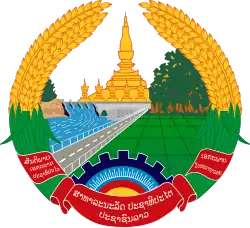New Economic Mechanism (Laos)
 |
|---|
|
|
New Economic Mechanism(Lao: ການປ່ຽນແປງໃໝ່, Romanized: Kanpianpaeng Mai)[1] is a market economic policies announced by the Lao People's Revolutionary Party during its 4th national congress in 1986.[2] The policy was focused on decentralized government control and encouraged private enterprise alongside state-owned enterprises.
Background
The Lao People's Democratic Republic was formed on 2 December 1975 after the victory of Pathet Lao in the Laotian Civil War,The country would later undergo socialist transition that lasted from 1975 until 1979. From 1979 to 1986, Laos adopted the Soviet Union style central planning as a basis of its economic policies.[3] However, due to the need of bringing the country back into the global stage and economic stagnation, Laotian leader Kaysone Phomvihane announced economic reform in 1986 during the 4th party congress.
The Lao People's Revolutionary Party believes that Laos is currently in a long process of "moving towards socialism ". Throughout the period of moving towards socialism , the Lao People's Revolutionary Party is a faithful representative of the rights and interests of the Lao working class , the working people and the entire nation. The party's purpose is to lead the Lao people to implement a principled and comprehensive reform line, maintain national security and stability, build a people's democratic system along the socialist goals , and build Laos into a peaceful , independent , democratic , unified and prosperous country. [4]
After its annoucement, the Laotian government begin to introduce series of deregulations such as the followings:[5]
- Price liberalization for selected sectors
- Liberalization for agricultural price which abolished state monopoly
- Increased autonomy for public enterprises and privatization
- Unification of exchange rate systems
- Foreign investment liberalization policies
References
- ^ "ພັກນຳພາການປ່ຽນແປງໃໝ່ ແລະ ສ້າງສາພັດທະນາ". ສຳນັກຂ່າວສານປະເທດລາວ (in Lao). 2017-03-27. Retrieved 2024-11-05.
- ^ "老挝继续推进的革新开放事业". 当前国际政治与社会主义发展 (17). 北京市国际共运史学会. 2001.
- ^ 海贤; 罗琴 (2020). "老挝革新开放以来社会主义建设的成就与经验". 东南亚纵横 (03): 58-68. CNKI DLYZ202003007.
- ^ 占塔琅西, 坎曼 (2018). "老挝人民革命党确立老挝迈向社会主义的路线". 当代世界 (09): 32-35. doi:10.19422/j.cnki.ddsj.2018.09.007.
- ^ Bourdet 2000.
Sources
Y. Bourdet (2000). The Economics of Transition in Laos: From Socialism to ASEAN Integration. Singapore: The Economics of Transition in Laos: From Socialism to ASEAN Integration.{{cite book}}: CS1 maint: publisher location (link)